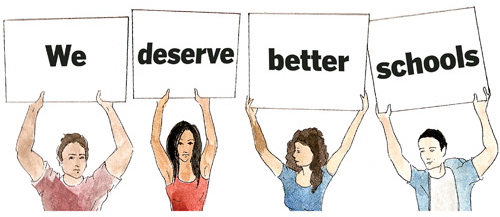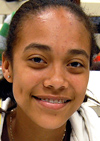Students should have a say in how they’re taught
l
I’ve been involved with the Council of Youth Research since the summer of sophomore year. I joined the council because my current mentor, Mrs. Rainge-Briggs, told me that I could benefit from doing college-level research and group work. After joining I wished I had started sooner. It felt like a calling. I was always a curious student but I didn’t believe anyone would listen to me because I was so quiet. The program has helped me become someone who speaks up for her ideas.
Throughout the program I have worked on three different topics. This year my group focused on powerful curriculum, which was my favorite topic. As a group we defined powerful curriculum as culturally relevant (or “mi herencia”); challenging (or “I never knew that”); and “appealing to different learning styles” such as visual and hands-on learners.
As a senior I’m taking AP classes but when we interviewed other students at our school who weren’t taking APs they said that most of their classes weren’t challenging. We thought that all classes should be as hard as most APs or college-prep classes.
I thought that was really unfair because the students we interviewed at other schools in richer school districts like Beverly Hills said that they were being challenged in their non-AP classes. We deserve that, too.
Before I researched this topic I didn’t realize that things could be better at my school. I had a teacher in the 11th grade who gave almost everyone Cs on their essays because they weren’t how she would have written them. But when we asked for help, she would sometimes say, “You’re a junior in high school, you should already know that.” Eventually I got better grades by asking family and friends for help, but I didn’t learn much about essay writing. I wished that teacher would have told us what we were doing wrong, but I didn’t speak up.
Students should have a role in designing how a classroom is run because they know how they learn and how they want to be taught. In my AP Government class this year our teacher noticed that a lot of students were unhappy with her policies, so she asked us what we wanted to do for quizzes and homework. Before, if you came in late or didn’t do the homework you could not take the morning quiz. But now you can take the quiz if you don’t do your homework. But to try to ensure that students complete the homework it counts double. This felt like the ideal way for teachers to cooperate with students.
I am most proud of sharing my ideas with my family, friends, classmates and teachers during our presentations. This was difficult for me, because I am a shy speaker. But knowing that my research is powerful gives me a confidence that I never had before. Being in CYR has given me a path to follow. In college, I hope to study more about social, racial and class inequalities.
I feel like I have an obligation to share what I know and continue to push for equality no matter what career I pursue. I want future generations to be more prepared than I was to deal with inequality in school. I know I can speak for all council members when I say we don’t settle for that crappy education anymore.








